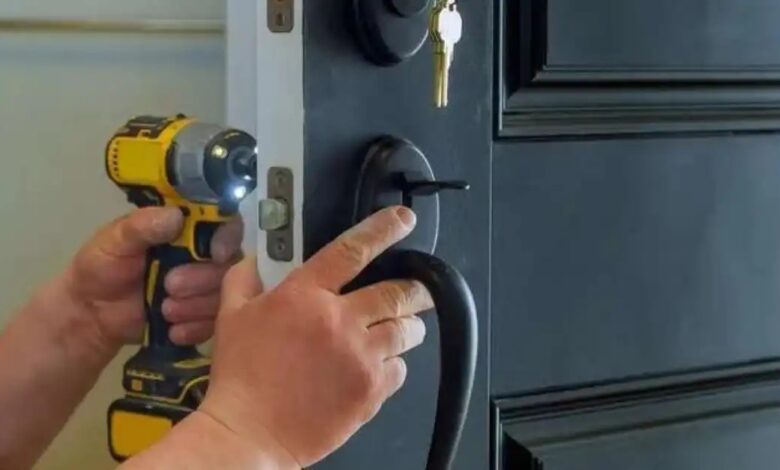Quick Fixes For Garage Door Repair Locksmith Ottawa

A jammed or faulty garage door can unravel your entire day—leaving you stranded outside or compromising your home’s security.
Whether it’s a stubborn lock, a misaligned track, or a snapped spring, these garage door repair headaches demand immediate attention. For Ottawa homeowners, ignoring minor issues can snowball into costly disasters, turning what could be a quick fix into a full-blown replacement.
But here’s the good news: many common problems can be resolved with minimal hassle—if you know the right tricks or when to call a trusted locksmith Ottawa specialist.
From recalibrating sensors to replacing worn-out rollers, this guide uncovers the fastest, most efficient ways to restore your garage door’s functionality. And if you’re facing a more complex issue?
We’ll help you identify when DIY efforts fall short and professional garage door repair Ottawa expertise becomes essential. Don’t let a malfunctioning door disrupt your routine—discover the shortcuts to a seamless fix today.
Common Garage Door Repair Issues and Quick Fixes
1. Garage Door Won’t Open or Close
Causes:
- Dead batteries in the remote
- Misaligned safety sensors
- Broken springs or cables
Quick Fixes:
- Replace the remote batteries.
- Check if the safety sensors are obstructed or misaligned—clean and realign them.
- If the garage door is heavy or unbalanced, the springs may be broken—call a professional locksmith in Ottawa for replacement.
2. Noisy Garage Door
Causes:
- Lack of lubrication
- Loose hardware
- Worn-out rollers
Quick Fixes:
- Apply a silicone-based lubricant to hinges, rollers, and tracks.
- Tighten all bolts and screws.
- Replace old rollers with nylon-coated ones for quieter operation.
3. Garage Door Lock Problems
Causes:
- Jammed lock mechanism
- Broken key inside the lock
- Worn-out locking components
Quick Fixes:
- Use a graphite-based lubricant to free up a sticky lock.
- If a key is broken inside, avoid forcing it—call a locksmith in Ottawa for safe extraction.
- Consider upgrading to a smart lock for enhanced security.
4. Off-Track Garage Door
Causes:
- Misaligned tracks
- Damaged rollers
- Sudden impact (e.g., hitting the door with a vehicle)
Quick Fixes:
- Loosen the track bolts, realign the door, and retighten.
- Replace damaged rollers immediately.
- If the tracks are bent, professional garage door repair may be necessary.
5. Frozen Garage Door in Winter
Causes:
- Ice buildup on tracks or seals
- Temperature-related contraction of metal parts
Quick Fixes:
- Use a de-icer or rubbing alcohol to melt ice on tracks.
- Apply weatherstripping to prevent moisture buildup.
- Keep the garage door well-maintained before winter hits.
When to Call a Professional Locksmith in Ottawa
While DIY fixes can resolve minor issues, some problems require expert intervention:
1. Broken Springs or Cables
- High-tension components can be dangerous to handle without proper tools.
2. Electrical Malfunctions
- Wiring issues in the opener should be handled by a certified technician.
3. Severe Structural Damage
- If the door is sagging or heavily dented, professional garage door repair is essential.
4. Lock Replacement or Rekeying
- A locksmith in Ottawa can ensure your garage door locks are secure and up to code.
Preventative Maintenance Tips
To avoid frequent garage door repair, follow these maintenance tips:
1. Monthly Inspections
- Check for loose bolts, worn-out parts, and lubrication needs.
2. Seasonal Adjustments
- Before winter, inspect seals and tracks for potential freezing issues.
3. Professional Tune-Ups
- Schedule annual maintenance with a locksmith in Ottawa or garage door repair specialist.
Conclusion
A malfunctioning garage door can disrupt your daily routine and compromise home security. While some issues can be fixed with simple DIY steps, others demand professional expertise—especially when dealing with high-tension parts or electrical components.
By following this guide, you can troubleshoot common problems and know when to call a trusted locksmith in Ottawa for garage door repair. Regular maintenance will extend the lifespan of your garage door, ensuring smooth operation year-round.
Don’t wait until a minor issue becomes a major headache—take action today to keep your garage door in top condition!
A malfunctioning garage door is more than just an annoyance—it can compromise your home’s security, safety, and convenience.
While some issues, like lubrication or sensor realignment, can be quick DIY fixes, others—such as broken springs, electrical faults, or lock failures—require the expertise of a professional locksmith in Ottawa. Ignoring these problems can lead to costly repairs or even accidents, making timely intervention essential.
To keep your garage door functioning smoothly, adopt a proactive approach with regular inspections and maintenance. Simple steps like tightening hardware, lubricating moving parts, and checking alignment can prevent major breakdowns.
However, when in doubt, always rely on a trusted garage door repair specialist to ensure long-lasting performance and peace of mind. Investing in professional care today can save you from expensive repairs and security risks tomorrow.
Don’t let a faulty garage door disrupt your daily life—take action now to maintain its efficiency and reliability. Whether it’s a quick adjustment or a full repair, addressing issues early will keep your garage secure and operational for years to come.
FAQs about Garage Door Repair Locksmith
Can a locksmith fix a garage door lock?
Yes, a locksmith can typically repair or replace a garage door lock, depending on the nature of the issue. Garage door locks come in different styles, including manual deadbolts, latch-style locks, and electronic locking mechanisms integrated with the garage door opener.
A professional locksmith can address problems such as broken keys stuck in the lock, malfunctioning locking mechanisms, or the need for rekeying.
However, if the issue involves the garage door’s structural components—such as misaligned tracks, broken springs, or a faulty opener—a specialized garage door technician may be required.
It’s always a good idea to consult with the locksmith first to determine whether they can handle the specific problem or if a different specialist would be more suitable.
How do I fix my garage door that I ran into?
Fixing a garage door after an impact depends on the extent of the damage. For minor issues like small dents or a slightly misaligned track, you may be able to make adjustments yourself by loosening the track bolts, realigning the door, and tightening everything back into place.
However, more serious damage—such as bent tracks, cracked panels, or broken springs and cables—should be handled by a professional garage door repair service.
Garage doors operate under high tension, particularly the torsion or extension springs, which can be extremely dangerous to repair without proper training and tools. Attempting DIY repairs on major damage could lead to further harm to the door or even personal injury, so it’s best to call a qualified technician for a thorough inspection and repair.
How do garage door locks work?
Garage door locks function differently depending on their type. Manual locks, often found on older or non-automated garage doors, typically consist of a sliding bolt or latch that secures the door to the frame or track when engaged. These locks are operated by hand, either from the inside or with a key from the outside.
Modern garage doors with automatic openers usually rely on an electronic locking mechanism that works in conjunction with the opener system.
When the opener is activated via remote, keypad, or smartphone app, the lock disengages to allow the door to move. Some models also feature a manual override, such as an emergency release cord, which disconnects the opener in case of a power outage or malfunction. Understanding how your specific lock operates can help with troubleshooting and maintenance.
How do you lift a broken garage door?
Lifting a broken garage door requires extreme caution, especially if the issue involves damaged springs, cables, or tracks. First, disconnect the automatic opener by pulling the emergency release handle (usually a red cord hanging from the opener rail).
If the door has a broken spring, it may be extremely heavy, so enlist the help of another person to lift it slowly and evenly.
Avoid placing your hands near the hinges or rollers, as they can pinch fingers. If the door is off-track or the cables are snapped, do not attempt to force it open, as this could cause further damage or injury. In such cases, the safest course of action is to leave the door as-is and contact a professional garage door repair service to handle the repairs properly.
How to open a stuck garage door?
If your garage door is stuck, start by inspecting the tracks for any debris, rust, or obstructions that could be preventing movement.
Clean the tracks thoroughly and apply a silicone-based lubricant to the rollers and hinges. Check if the door is properly aligned—if it appears crooked, the tracks may need adjustment. If the door still won’t move, try manually disengaging the opener by pulling the emergency release cord, which allows you to lift the door by hand.
However, if the door feels unusually heavy or makes grinding noises, there may be a broken spring or cable, which should only be repaired by a professional.
Forcing a stuck door open can worsen the problem, so if basic troubleshooting doesn’t resolve the issue, it’s best to call a garage door technician for a proper diagnosis and repair.




